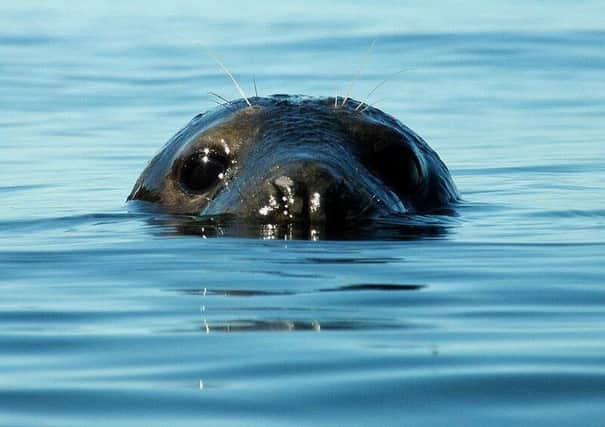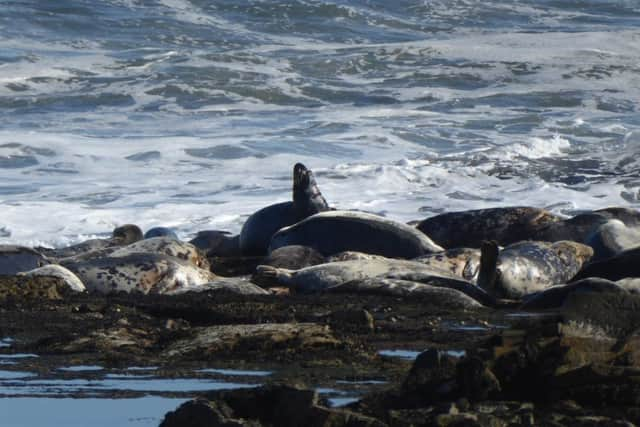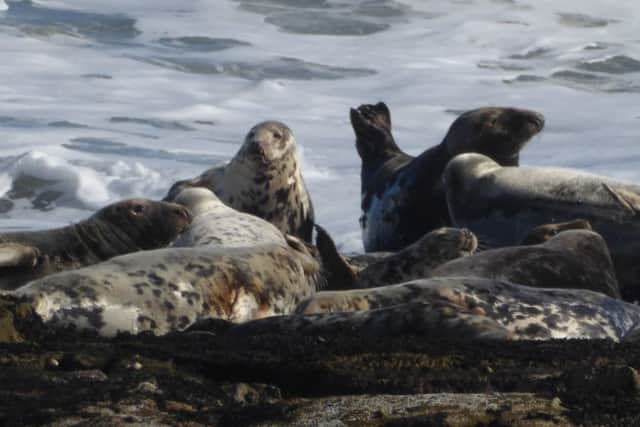NATURE NOTES: Seals' lament fills the air


If it is quiet and the tides are kind, I like to pause before the bridge – to look out and to listen. There are curlews there, long-billed and calling their names in flight – the smaller redshank, with their whistling call – the scratchy grating cry of the grey heron.
Below all this, I hear a low keening moaning. It is like the wind, almost, but the day is still. As the light clears, sunlight glimmers off dark shining shapes like wet rocks on a sandbank. One of them yawns, large jaws agape.


Advertisement
Hide AdAdvertisement
Hide AdThese are Atlantic grey seals, and theirs is the lament which fills the air.
Stories were once told of sirens singing to lure sailors onto the rocks and seals were very likely the culprits.
Yet – perhaps redeeming the seals a little – at a 1938 conference in Newcastle, fishermen claimed that the cries of seals allowed them to locate and avoid the dangerous rocks around the Farne Islands.
The relationship between the seals and the humans who fish the sea has long been an ambivalent one – they are companions, and competitors. Seals tear nets and leave lines bereft, yet may lose their lives tangled in fishing gear or caught in propellers.


Advertisement
Hide AdAdvertisement
Hide AdThe Farne Islands host one of the largest Atlantic grey seal breeding colonies in England.
Adults number many thousands, with around 2,200 pups born each year.
It is pupping season on the islands and last week’s census numbered almost 800 wide-eyed seal pups, born in the sanctuary of a National Nature Reserve.
The pups’ rumps are marked with a harmless vegetable dye by intrepid National Trust rangers, enabling them to count the number born and gain a sense of their mortality rate. It is no easy task. Even as pups, seals have a sharp end – and can carry illnesses, known as zoonoses, that are communicable to humans.
Advertisement
Hide AdAdvertisement
Hide AdAs appealing as seals may seem, it is wise for walkers and dogs to give them a wide berth.
A seal encountered on a beach is rarely cause for compassionate concern – simply one who has chosen a poor place for a nap.
West of the Farnes, at Lindisfarne National Nature Reserve, they haul out in their thousands on sandbanks.
If left undisturbed they will snooze for much of the day. Of course, there are exceptions. Sadly, seals are sometimes found caught up in ‘ghost fishing’, the lost or discarded remains of nets and lobster pots, or fall victim to the rising tides of plastic pollution – whether through swallowing plastic bags, or becoming trapped or injured by rubbish.
Advertisement
Hide AdAdvertisement
Hide AdAlthough common here, Atlantic grey seals are one of the most endangered seal species, with fewer than 400,000 worldwide. The UK is home to around 38 per cent of the global population.
Looking out at the many heads bobbing in the water, it seems to me that their gazes are reproachful – yet, being rather short-sighted, they probably regard me as just another rock on the shore.
I recall that their scientific name halichoerus grypus means hook-nosed sea pig. This is, perhaps, some cause for reproach.
On land, seals are graceless; the most ungainly of creatures. When frightened they make for the water at a sort of high-speed belly-flop. And yet, within moments, they are transformed. In their element, they are sleek, agile and graceful.
Advertisement
Hide AdAdvertisement
Hide AdLike humans, seals once evolved from sea creatures into land mammals. Unlike humans, they returned to the sea. Watching from the shore, landlocked, I envy their choice.
If you find an injured, thin or ill seal contact the British Divers Marine Life Rescue (BDMLR) for advice or assistance on 01825 765546 Monday to Friday, 9am to 5pm, or 07787 433412 at other times.